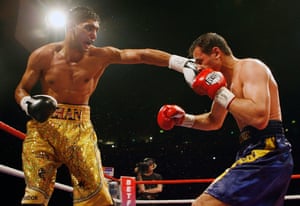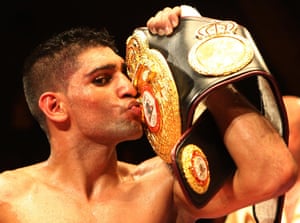My favourite game: Amir Khan shows his class to claim first world title | Jamie Jackson | Sport
18 July, 2009: an ecstatic Amir Khan claims his maiden world title, five years after the boy from Bolton lost the Olympic lightweight final to the great Cuban amateur Mario Cesar Kindelán.
The crown Khan won at Manchester’s MEN Arena was Andreas Kotelnik’s WBA light-welterweight title and the abiding memory is the vividness of a hot midsummer evening. Boxing crowds can be too easily filed alongside football fans. There are similarities but there is a particular noise and vibe that rattles the rafters and tightens the arena into a bear pit which is off-kilter and intoxicating.
That night a partisan crowd were raucous in cheering Khan as he walked towards battle. Luminous and in perfect shape, the 22-year-old breathed hard and looked as anxious as his family sat at ringside. Wrapped in a gold cape, he moved along his yellow brick road to the canvas. With Khan came an extra frisson, a tangible breathlessness that something extraordinary could be about to happen.
“This is the moment Bolton’s talented and dedicated sportsman has been waiting for since he first laced up the gloves at eight,” said Ian Darke in commentary. His summariser, Jim Watt, added: “There’s still questions to be answered and they’re going to be answered tonight.” The former WBC lightweight champion was correct: what followed was a scintillating exhibition from Khan in which questions were not merely answered, they were coldly disallowed.
Khan’s nervousness vanished. From first bell to last this was a cool-eyed dismantling of the stone-fisted Kotelnik, whose CV showed two defeats to the challenger’s one. In round 10, Khan’s hands poured down like rainfall on Kotelnik and his family were on their feet, believing he was about to become world champion by stoppage. The Ukrainian clung on until the last three minutes were over but there was no doubt whose arm the referee, Stanley Christodoulou, would raise.

On judges’ scorecards of 120-108, 118-111, 118-111, it was an emphatic triumph. Here was a moment to savour. The expression on Khan’s face showed a purity of joy and an inability to fully comprehend what he had achieved: the turning of a childhood dream into reality.
When Khan, a then 17-year-old novice, became world under-19 lightweight champ in Jeju four weeks before an Olympic Games in which he was Great Britain’s sole boxing representative, he was advertised as heading for a fistic Shangri-La. After avenging his defeat by Kindelán in a final amateur outing in May 2005, he turned professional and reeled off 18 wins, 14 inside the distance.

Then came a defeat that cast him as a pygmy in a land of giants: the harrowing 54sec knockout by the Colombian Breidis Prescott in September 2008 that left Khan dazed and confused, also at the MEN Arena.
Two comeback wins – against journeyman Oisin Fagan in two rounds and a 35-year-old Marco Antonio Barrera – hardly suggested the Prescott humiliation would prove an outlier. Yet on Khan’s night of nights, all that was forgotten.
This writer began his report for the Observer with the introduction: “An evening billed as the ‘Man who would be King’ ended in supreme and deserved ecstasy for the prospective new member of fight-game royalty, Amir Khan, who took the first world crown of a career that, following a near-masterclass performance to defeat Andreas Kotelnik and claim his WBA light-welterweight title, could be now filled with stardust nights in the pay-per-view palaces of Las Vegas and Madison Square Garden.”
What followed was this: five defences plus the adding of the IBF crown by the stoppage of Zab Judah in Las Vegas in July 2011. Khan lost both titles to Lamont Peterson a year later in Washington and has not been a world champion since but the performance against Kotelnik will always stay in the memory – his and of those present.



